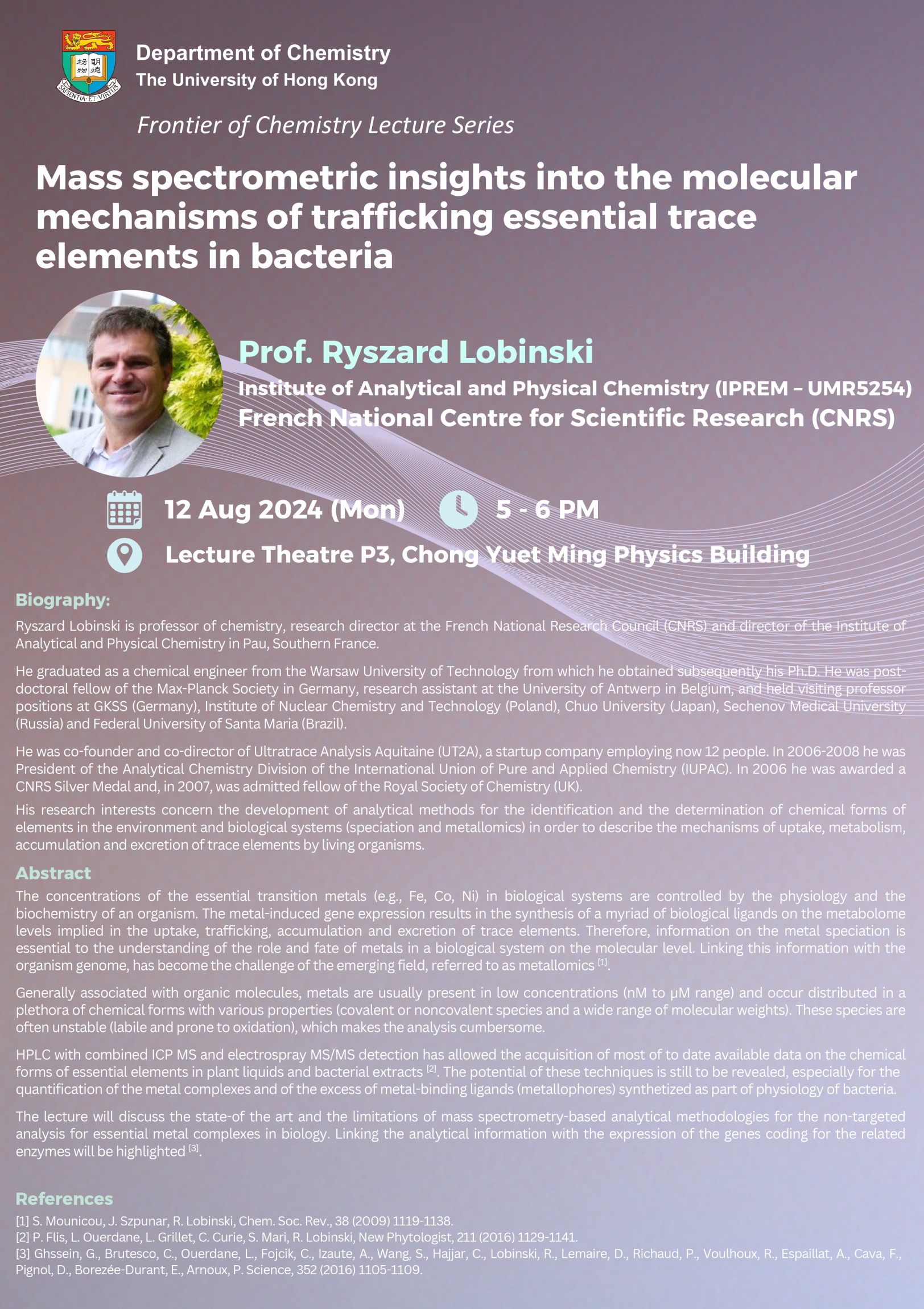| Date | 12 Aug 2024 |
| Time | 5:00 pm - 6:00 pm (HKT) |
| Venue | Lecture Theatre P3, Chong Yuet Ming Physics Building |
| Speaker | Prof. Ryszard Lobinski |
| Institution | Institute of Analytical and Physical Chemistry (IPREM – UMR5254), French National Centre for Scientific Research (CNRS) |

Title:
Mass spectrometric insights into the molecular mechanisms of trafficking essential trace elements in bacteria
Schedule:
Date: 12th August, 2024 (Monday)
Time: 5 - 6 pm (HKT)
Venue: Lecture Theatre P3, Chong Yuet Ming Physics Building
Speaker:
Prof. Ryszard Lobinski
Institute of Analytical and Physical Chemistry (IPREM – UMR5254)
French National Centre for Scientific Research (CNRS)
Biography:
Ryszard Lobinski is professor of chemistry, research director at the French National Research Council (CNRS) and director of the Institute of Analytical and Physical Chemistry in Pau, Southern France. He graduated as a chemical engineer from the Warsaw University of Technology from which he obtained subsequently his Ph.D.
He was post-doctoral fellow of the Max-Planck Society in Germany, research assistant at the University of Antwerp in Belgium, and held visiting professor positions at GKSS (Germany), Institute of Nuclear Chemistry and Technology (Poland), Chuo University (Japan), Sechenov Medical University (Russia) and Federal University of Santa Maria (Brazil).
He was co-founder and co-director of Ultratrace Analysis Aquitaine (UT2A), a startup company employing now 12 people. In 2006-2008 he was President of the Analytical Chemistry Division of the International Union of Pure and Applied Chemistry (IUPAC). In 2006 he was awarded a CNRS Silver Medal and, in 2007, was admitted fellow of the Royal Society of Chemistry (UK).
His research interests concern the development of analytical methods for the identification and the determination of chemical forms of elements in the environment and biological systems (speciation and metallomics) in order to describe the mechanisms of uptake, metabolism, accumulation and excretion of trace elements by living organisms.
Abstract:
The concentrations of the essential transition metals (e.g., Fe, Co, Ni) in biological systems are controlled by the physiology and the biochemistry of an organism. The metal-induced gene expression results in the synthesis of a myriad of biological ligands on the metabolome levels implied in the uptake, trafficking, accumulation and excretion of trace elements. Therefore, information on the metal speciation is essential to the understanding of the role and fate of metals in a biological system on the molecular level. Linking this information with the organism genome, has become the challenge of the emerging field, referred to as metallomics [1].
Generally associated with organic molecules, metals are usually present in low concentrations (nM to µM range) and occur distributed in a plethora of chemical forms with various properties (covalent or noncovalent species and a wide range of molecular weights). These species are often unstable (labile and prone to oxidation), which makes the analysis cumbersome.
HPLC with combined ICP MS and electrospray MS/MS detection has allowed the acquisition of most of to date available data on the chemical forms of essential elements in plant liquids and bacterial extracts [2]. The potential of these techniques is still to be revealed, especially for the quantification of the metal complexes and of the excess of metal-binding ligands (metallophores) synthetized as part of physiology of bacteria.
The lecture will discuss the state-of the art and the limitations of mass spectrometry-based analytical methodologies for the non-targeted analysis for essential metal complexes in biology. Linking the analytical information with the expression of the genes coding for the related enzymes will be highlighted [3].
References:
[1] S. Mounicou, J. Szpunar, R. Lobinski, Chem. Soc. Rev., 38 (2009) 1119-1138.
[2] P. Flis, L. Ouerdane, L. Grillet, C. Curie, S. Mari, R. Lobinski, New Phytologist, 211 (2016) 1129-1141.
[3] Ghssein, G., Brutesco, C., Ouerdane, L., Fojcik, C., Izaute, A., Wang, S., Hajjar, C., Lobinski, R., Lemaire, D., Richaud, P., Voulhoux, R., Espaillat, A., Cava, F., Pignol, D., Borezée-Durant, E., Arnoux, P. Science, 352 (2016) 1105-1109.
- - ALL ARE WELCOME --
